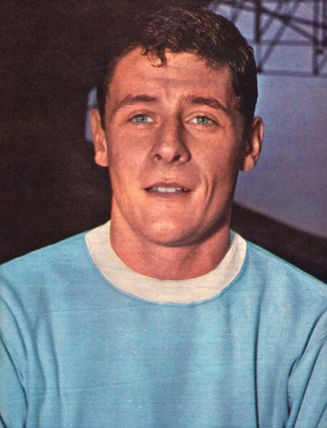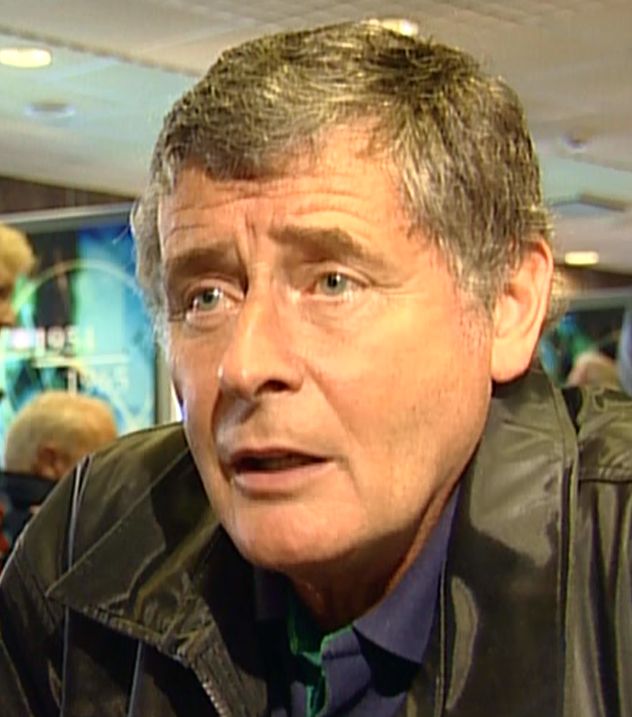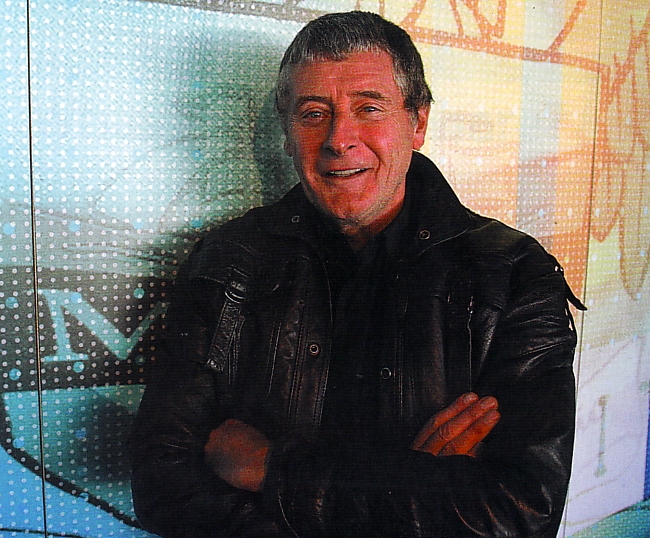ROY CHEETHAM

Obituary Roy Cheetham 1939-2019
Former City half back Roy Cheetham sadly passed away on 9th December, aged 79.
Cheetham was born in Eccles, Manchester and grew up watching City one weekend, United the other as the football-mad youngster dreamed of one dat playing professionally.
After playing for Manchester Boys, he was scouted by City who offered him the opportunity of signing as an amateur in July 1955. A year later,he turned professional and made his debut during the 1957/58 campaign during a 2-1 win over Luton Town.
Though he kept his place for the trip to Arsenal the following week, Jimmy Bloomfield caused the teenager numerous problems during a 4-2 defeat and Cheetham was sent back to the reserve team to further develop his game.
Cheetham would never nail down a first team spot but was called upon by manager Les McDowall and then George Poyser for regular spells as cover for injured players. Joe Mercer also gave Cheetham a number of games in his first season as City boss, but as he rebuilt the side into a force to be reckoned with, so Cheetham’s opportunities became less and less, though he became the club’s first ever substitute when he replaced Mike Summerbee in a clash with Wolves in August 1965.
In January 1968 he took the chance to sign for Detroit Tigers, ending a 13 year spell with City. He had made 143 appearances during the time, scoring four goals. He only stayed briefly in the USA, returning to sign for Charlton Athletic, and then Chester soon after. He hung his boots up in 1972 but hislove for City never waned and in 2007, he became the treasurer of the Manchester City Former Players’ Association, a role he thoroughly enjoyed and one where he made many friends.
Everybody at Manchester City would like to send their condolendes at this difficult time.
FROM CITY PROGRAMME 21ST DECEMBER 2019

AN INTERVIEW WITH ROY CHEETHAM FROM DECEMBER 2004
Let’s start with the holiday period, do you have many memories of Christmas and New Year games?
We would often play about four games in seven days depending on how Christmas fell, and usually you’d end up playing the same team twice during that time. I remember we had a couple of really strange results against Birmingham City. We got beat 6-1 at their place on Boxing Day (1958), and then we beat them 4-1 the next day at Maine Road, although I didn’t play in that second game. It was always a strange period because results would always vary. Perhaps playing on consecutive days caused the defeated side to be more determined the next day.
Going back to your boyhood, presumably football took up most of your free time?
You’d play at every opportunity, and everyone in the area would be playing. We all wanted to be footballers, but you knew that there was so much competition. Even getting into your school team was hard. I grew up in Newton Heath, not far from today’s stadium, and I went to St. Margaret’s school. I got into the school team and we had a great sports teacher who also ran the Manchester Boys team. I was lucky enough to get into that and continued to progress.
People may not realise today how important the Manchester Boys side was, can you explain where you played, and the focus on the side?
Manchester Boys would play their home matches at the big local venues, Maine Road, Old Trafford, and I remember playing at the old Belle Vue speedway stadium. Crowds of twenty thousand or more would turn out and I was fortunate enough to play in the very first televised Boys match in England. The BBC filmed London Boys v Manchester Boys at White Hart Lane for a midweek sports programme, and I remember Jimmy Greaves played for the London side. But that was the type of focus the Boys sides would get. If you got into Manchester Boys, scouts from all over would come and watch.
Obviously, City watched you but did any other club come in for you?
City were the most persistent side, but United and Wolves were interested. l wanted to come to City and, because players like Roy Paul and Bert Trautmann were my heroes then, there was no real choice. Having said that I also knew that United had a good youth set up, and I also recognised the quality of their side. As a lad I used to watch whichever side was at home, one week City, one week United. Most of the people I knew in those days did that because you could never really travel to away games, and there was virtually no football on the television. lf you wanted to see the likes of Finney play you had to wait until he came to Maine Road or Old Trafford. Anyway, City’s interest came from a great, wonderful guy called Harry Godwin. Harry was City’s Chief Scout and he spent every minute of his life searching for good talent. He came to our house, spoke with my grandparents, and I joined City.
Was it a gamble for you to give up on school work to focus on football?
Of course. I actually left school a year early because I had a guaranteed job, City gave me a job on their groundstaff, and I know a few people thought it was a bad decision and I guess if I’m honest it’s not the sort of thing you should do. At that age though if someone offers you a dream come true opportunity to join the team your idols played at then you had to take that chance. So many of us wanted to play football but we knew chances would be limited. Anyway, on the groundstaff I’d clean boots and do all the other activities you’d expect and I loved being at City.
At City you progressed through the Colts, B, A, and Reserve sides and made your League debut at Luton in March 1958. Do you remember much of that game?
I think Ken Barnes was injured, so that‘s how the chance came for me. It was a great experience of course and I know we won 2-1. I thought I did okay, but I do remember that it was difficult adjusting to the pace initially. It was so much quicker than the Reserves, but I did have a lot of good players around me? so that made me feel more comfortable.
You kept your place for the next match, was that another good experience?
It brought me down to earth a little, we got beat 4-2 by Arsenal! Ken was also more or less ready to come back so after that game he returned and I was back in the Reserves. Now playing for the Reserves was also a significant step for an 18 year old back then, You’ve got to remember Reserve sides were comprised of players who had lost their first team place for some reason and were desperate to get back; others who were nearing the end of their careers but knew hovv to handle themselves; and up and coming lads who were pushing for a first team place. So reserve fixtures were hot-blooded affairs and they would also get decent crowds. We also used to have games against the first team and they’d be real battles because you’d want to test out the guy who had your position. I remember playing a reserve game against United and they had five Internationals playing, full, recognisable internationals

ln 1958-9 you had a decent run in the first team making 18 appearances, are there any games from this period you remember vividly?
The derby match with United in September 1958. We ended up drawing 1-1 and it was my first League game of the season. I was still only 18 and there were about 63,000 at Maine Road, and here I was pIayIng_aIong side my heroes Trautmann, Barnes, Hayes, Ewing and the others, against another team of heroes, Dennis Viollet & Bobby Charlton. The game started and within the first few minutes I gave United a penalty, apparently I’d cut Charlton’s legs from under him! and I thought this was it. I thought I’d never play again. Charlton scored and I felt awful. But, with the help of the other players, I started to get myself back into the game and, in some ways, the early penalty had made me. I ended up playing one of my best games, certainly at that age. Joe Hayes scored an equaliser and we had a penalty saved, plus there was the usual derby controversies, so it became a very memorable day for me. After the game the Daily Mirror used to award “Andy Capps”, named after the comic strip character, in recognition of the player who made the biggest impression, and they awarded it to me. So a day that started out badly became a great one for me.
You mentioned great players, presumably when Denis Law arrived in 1960 that gave everyone a lift as well?
Well, Denis was a major signing for City at the time and it did lift us all. The fifties Cup team had started to break up, so it was good to get someone like Denis in. People remember him more for his later spells at United, but I remember him for that first year or so he was with us. Back then he would be everywhere on the pitch, taking throw-ins, defending, attacking, a great player to play with. People think of him as an out and out attacker, but at City he did everything. It was sad when he left, and I guess that’s when things started to feel different at Maine Road.
Those early sixties saw City struggle, how did it feel to you as a player?
It was really odd, because we had several really good players. Many of them are rarely given the acclaim they deserve but guys like George Hannah, Dave Wagstaffe, Derek Kevan, Jimmy Murray and so on were good players. For some reason though it was all fairly flat. Maybe it was the direction from above. We were inconsistent but there was no obvious reason why, and because of this I think there was general apathy on the terraces as well. It was as if we were all, players, officials, and fans, waiting for a spark but none of us knew how to get the fire going. The winter of 1963 didn’t help either. We couldn’t play because of frozen pitches, and we couldn’t train for the same reason, so it was all rather downbeat and negative and when we were relegated in ’63 we all knew we had a good squad but the drive was missing.
The situation worsened until in 1965 Joe Mercer and Malcolm Allison arrived. Was this a good appointment for you personally?
Joe and Malcolm gave everyone the lift we needed. Simply seeing and hearing the guys was enough to motivate you. I remember being on the training pitch shortly after they arrived and Malcolm called me by my first name. I know it seems a simple thing but that made me immediately realise this guy was interested enough to know who I am. He’d only been here a couple of days but already he knew and was interested, that gave me a great boost. The only problem for me was that I was about 26 and there were younger players coming through who offered more than I could. I gave it my best shot, but I couldn’t help wondering how things would be if I was 20.
You made 12 (plus 3) League appearances in the promotion season, but by 1967 your City career was coming to an end. How did you feel about moving on?
It became inevitable really. Joe Mercer always had time for me and I was always in the squad, but with the others coming through I knew opportunities would be limited. Let’s face it Mike Doyle had better determination than most of us, and Alan Oakes never missed a game, he never caught a cold, so there was no chance of replacing either of those. Then in the summer ot ’67 a call came through that they were setting up an American soccer league and I was asked to sign for Detroit Cougars. I spoke with Joe and he said l could go, see how it all works out and if it didn’t work out l could come back. So I signed for Detroit in ’67 but was on loan with City until January ’68 when Detroit would start training.
While on loan at City you made 2 (plus 1 sub) appearances in the Championship season. Did that feel strange?
Well the chance came along to play and I actually played well. I was in good form but Joe reminded me I was on my way to Detroit and he had to think about the long term plans, so it was clear I couldn’t really become a permanent fixture. It was a weird situation, but at least I played in three Championship games. Then I moved to Detroit and that was a bit of a shock. I arrived just as the riots were taking place in the city! My initial thought was ‘what have I doneI’ I’d left a championship seeking side for a riot torn city. Despite that I loved the two years there and it was all a great experience. The razzmatazz was all different from Manchester, we had names on our shirts and each player was announced individually. I know that’s all normal now, but back then it felt more like showbiz. The team would be made up of about 7 or 8 different nationalities and away games were like going on a long holiday. We’d play a few games on the road because of the distance we’d have to travel.
Was this your first time in the States?
No. I’d been with City in 1958 when I was 18. We toured America and Canada and I just couIdn’t believe my luck. Two years earlier l’d stood on the Kippax watching these great players and then here I was playing on tour with them. The whole experience was great, although it took us about a week to get to America, we travelled by boat. The crowds were mostly made up of Europeans and Latin Americans, but it was a wonderful experience.
After Detroit, you played for Charlton, Chester and then became a player-manager with Great Harwood and then a Canadian side, Windsor Stars, did you ever consider developing your career in League management?
I thought about it and, now looking back, in some ways I wished l’d tried to stay in the game, but I had a wine shop and a young family, and the wine shop offered stability. With football I may have had to move every couple of years, so I concentrated on the business. Then, once you’ve been away from the game for a few years, it’s impossible to get back into it. People question why you haven’t continued and you just can’t find a way back in. I continued with the business for quite a few years, then I worked for Kodak, and nowadays I’m employed at Wythenshawe Hospital. l’m also involved with the former pIayers’ association and, of course, I come and watch City as l’ve done all my life.
Finally, looking back which players do you regard as the greatest you’ve seen or played with?
I was fortunate that I played with so many of the great fifties team and was there at the start of the wonderful Mercer-Allison side. Both those teams contained truly great players, it’s impossible to list them all. For me Ken Barnes has always been one of the best, how could he never receive a cap? He was far better than some of the guys who did play for England! We’ve had lots of great players, mind , you, my granddad always told me that Billy Meredith was the greatest City player of all time, so how can I argue. It’s great to have been with a Club with such a strong legacy of playing talent. I loved my time at City and loved being a part of this club.
INTERVIEWED BY GARY JAMES, PUBLISHED IN THE CITY PROGRAMME 1ST JANUARY 2005
